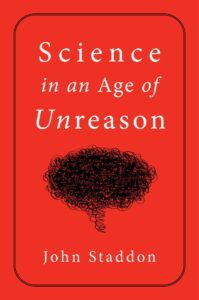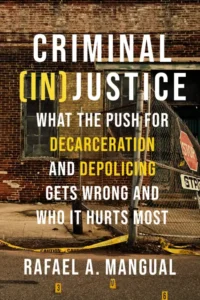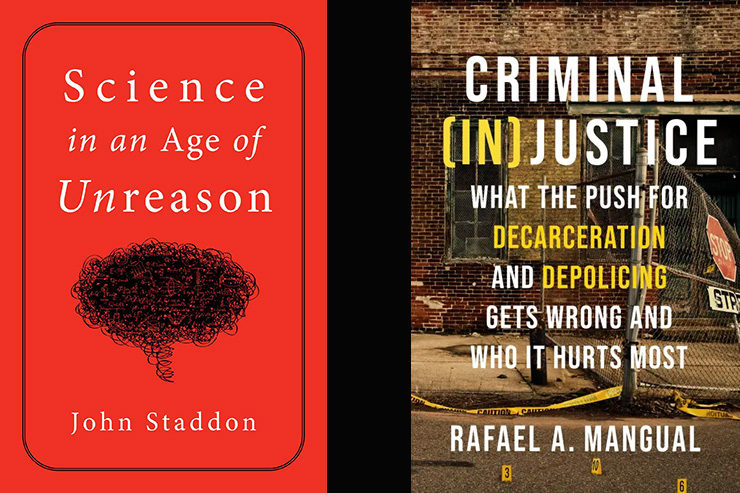
Science in an Age of Unreason, by John Staddon (Regnery Gateway; 256 pp., $29.99). The long-running cultural debate about the role of science and scientific experts in American life has gotten more heated of late. Science has been tremendously productive, in terms both of human health and material advance, but it is not a perfect form of knowledge. It cannot serve as a moral anchor for this or any other society, and it can prove immensely dangerous when misused.
Science is a messy, social process. It is the best tool we have for investigating the workings of the material world, but it can be hijacked in numerous ways. Ideological mendacity, selfishness of individual scientists, insufficient commitment to a difficult process—which can be time-consuming and costly—and sabotage from outside by those ignorant of its workings can turn science from boon to bane.
John Staddon has done an admirable job of describing how science is being separated from its most defensible elements and wielded by woke, progressive radicals to impose their ideological beliefs on the rest of us. This transformation of science into a politicized weapon is most apparent in the social sciences. There, evidence-free claims about the consequences of “structural racism” and other imaginary entities are now made in the most prestigious journals.
But the hard sciences are in danger, too. Staddon provides useful and appropriately complicated discussions of the debates over climate change and the place of evolutionary thought in examining the meaning of human life.
A surprising absence in this solid book is an engagement with vicious bickering in our society about COVID-19 and the public-health response to it. Staddon excuses himself for passing over this topic by noting that too much is still unknown for him to speak with authority on what we have learned about the science of infectious disease in the last two years.
He is not wrong on that point, but we do know enough to speak with certainty about at least two major problems the pandemic has made clear. First, too many in the “expert” community have a propensity to engage in catastrophizing, which undermines public order through rhetorical extremism. And second, know-nothings with social media platforms pose the danger of influencing segments of the population to reject effective public-health responses to infectious disease. I would have enjoyed reading Staddon’s take on this.
(Alexander Riley)

Criminal (In)Justice: What the Push for Decarceration and Depolicing Gets Wrong and Who It Hurts the Most, by Rafael A. Mangual (Center Street; 256 pp., $29.00). The Manhattan Institute’s head of research for policing and public safety, Rafael Mangual, addressed a U.S. Senate subcommittee in the spring of 2021. Wide swaths of Portland, Minneapolis, and Kenosha then lay in ruins after the Black Lives Matter protests. Mangual described criminal justice to the senators as “among the most important public policy debates of our time.” No doubt Mangual’s ominous assessment bounced right off the closed minds of committee members.
Luckily for posterity and the common good, Mangual has memorialized his thoughts. In this succinct book, he rails against the “heinous and serious crimes perpetrated by repeat offenders who could have been, but weren’t, behind bars at the time.” Mangual details how the left erected an Everest of deceit about an “oppressive carceral state,” about “unjustifiably aggressive overpolicing,” and about the sine qua non of all leftist rhetoric, “racism.”
Facts find no refuge on the left’s docket. Mangual, by contrast, provides facts to a fault. At times his work reads like a statistics textbook. But assiduous reading pays off. America’s supposedly oppressive police state unfortunately reflects our violent society. Compare England and Wales—with a combined population of 59 million and 726 homicides in 2018—to four neighborhoods on Chicago’s West Side, with 189,846 residents and 121 homicides. The murder rate per capita in “Chiraq” is more than 50 times greater.
Overpolicing—really, any policing—strikes the left as overly aggressive. And racist too! But remember that while black males commit violent crime at wildly disproportionate rates, they often commit those crimes against other black males. Black males therefore get arrested more frequently, and the black males who are potential victims benefit more than anyone else from such arrests. If you hate blacks, then you should argue for a reduced police presence in black neighborhoods as, no surprise, many on the left do.
Mangual’s solutions will only further enrage leftists, including blowhards and gerontocrats on do-nothing senate committees. Count on the left to sound like pro-family evangelical Christians should we start removing children from violent parents, as Mangual suggests. And his call for more prosecutors, defense attorneys, and judges to expedite criminal trials will surely lead to more cries of oppression and racism from thug-huggers. Expect crime to continue its post-Floyd spiral until we heed Mangual’s wisdom.
(John Greenville)

Leave a Reply